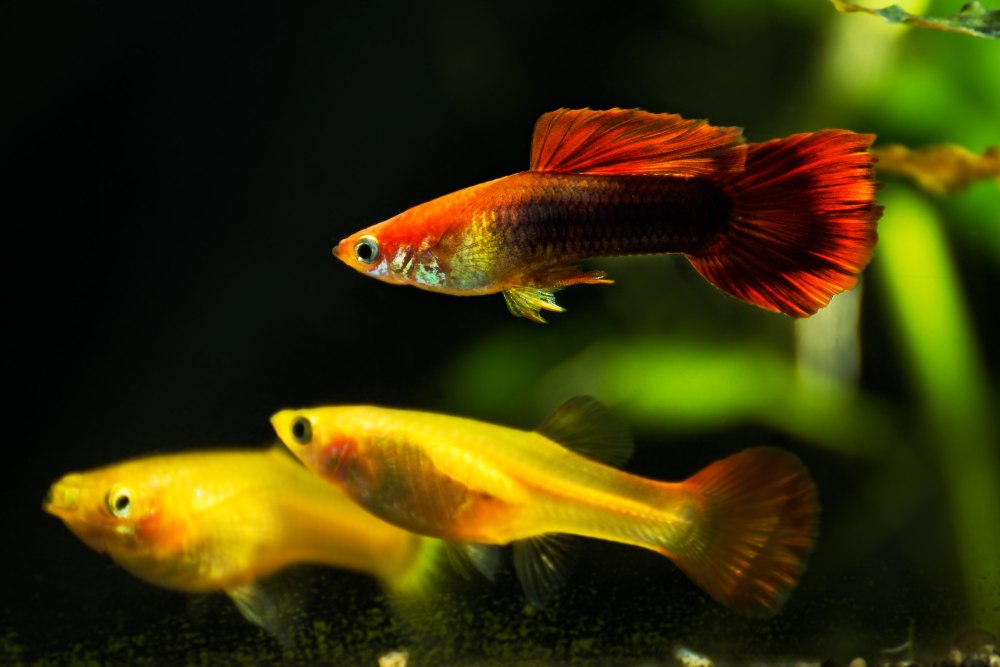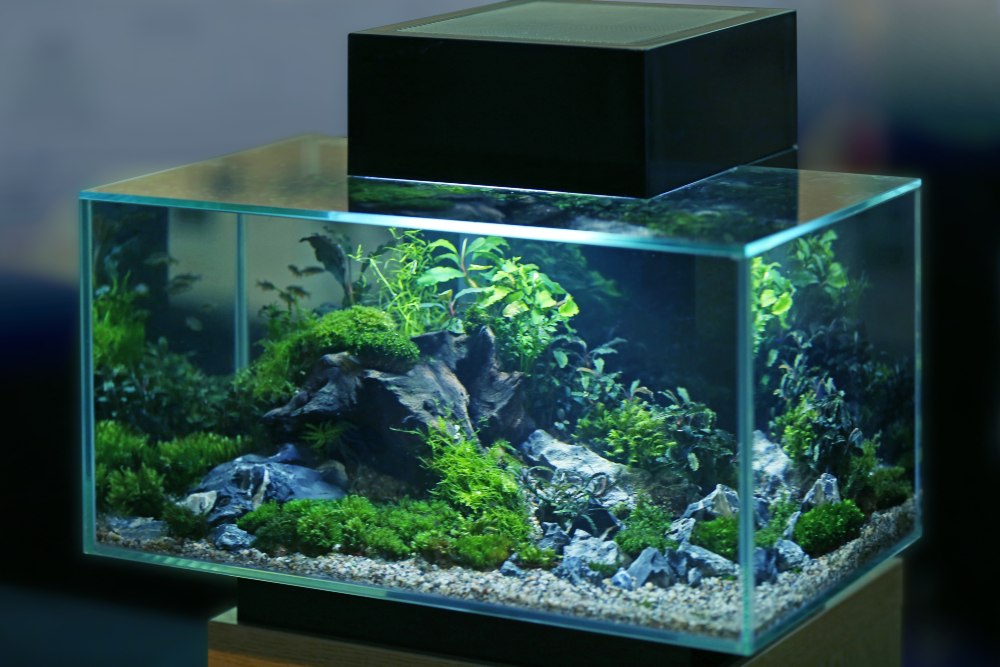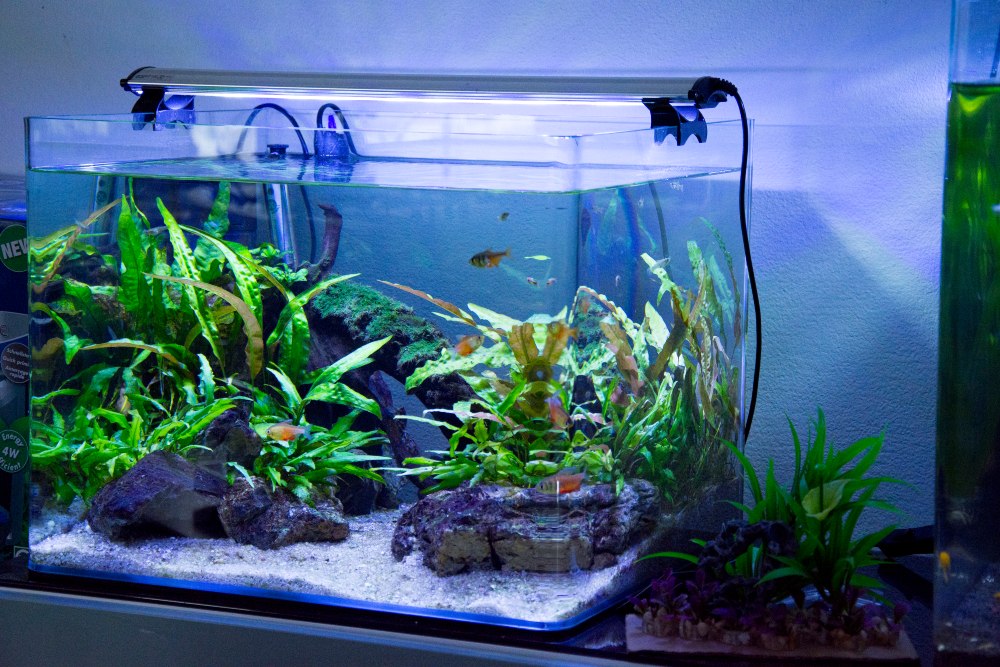Betta fish are challenging to keep in a community tank.
Due to the territorial nature, betta fish either attack their tank mates or get depressed, fearing threats from the other fish or aquatic animals in the same aquarium.
However, a few species of aquatic animals can coexist with the betta fish without bothering each other.
Guppies are one of the choices when it comes to choosing betta fish tank mates. But can bettas and guppies live together? Yes, you can keep guppies and bettas in the same tank. But keeping them together requires careful preparation.
In this post, I’ll discuss everything related to keeping guppies and betta fish together, their living requirements, and much more.
Things You Should Know Before Keeping Guppies And Betta Fish Together

As you might already know, bettas are very particular about their living conditions. Similar to Goldilocks, betta fish need their living conditions to be just right. They can’t survive if the water parameters or pH are off. Therefore, you must choose companions that require a similar environment.
Do guppies have the same tank requirement, food habits, and temperament as bettas? Let’s find out.
Water Parameters For Guppies And Betta Fish

Bettas and guppies prefer different water parameters. Bettas are tropical freshwater fish from Southeast Asia. They prefer warm, soft, and acidic waters, which are common in rice paddies, and slow-moving streams.
The ideal water temperature for bettas is between 75 to 80 degrees Fahrenheit with a pH level between 6.8 and 7.5.
Similar to bettas, guppies prefer living in waters with a pH range of 6.8 to 7.8. As for temperature, guppies are originally from the lakes and rivers of South America and enjoy waters that sit between 74 to 82 degrees Fahrenheit.
Although there are some differences between the preferred water quality, the difference isn’t huge.
Between both guppies and bettas, bettas are less flexible when it comes to living conditions.
Hence, you have to make the guppies acclimatize to the betta tank. You can easily find a mid spot for the temperature. Both prefer warmer waters between 75 to 82, so a tank temperature of 78 to 80 degrees Fahrenheit will be perfect for them.
You can use a tank heater to maintain the temperature. The constant fluctuation in the temperature isn’t good for bettas and guppies, so a water heater is a must.
Water Filter
To ensure the water quality is always fine and maintains the above levels, you have to invest in a good water filter. Both guppies and bettas need clean water. They can’t survive in dirty tanks as they are susceptible to skin infections and other diseases.
Hence, investing in a good tank filter is a must to keep the water clean. But note that bettas can’t live in fast water currents.
Therefore, get a tank filter with an adjustable flow rate and keep the water current always low. Guppies have no problem living in slow-moving waters—another benefit!
Additionally, change 20% of the tank water every week to keep the water clean and free from toxins.
Never make the mistake of changing the entire water in one go. Such a drastic change will shock the betta fish leading to stress and diseases, like stress stripes.
Tank Size & Decorations
Even though the Siamese fighting fish or the betta are smaller fish species, they require a lot of space.
You can’t keep your betta fish in a small bowl and expect it to be thriving. As they are used to living in the lakes and pits, keeping them in a smaller tank will stress them out.
Similarly, guppies also can’t survive in smaller tanks.
So, if you’re planning to keep bettas and guppies together, investing in at least a ten-gallon tank is a must. But I recommend getting at least a 20-gallon tank to let both species enjoy their space.
Another benefit of keeping them in a large tank is that they will come into contact with each other less frequently, which means fewer chances of violence.
Please note that a 20-gallon tank is only ideal if you keep only one betta fish and a couple of guppies.
If you plan to add more guppies, size up.
Let’s talk about tank decorations. Bettas love murky, shady waters with less light as they are from tropical waters that are covered with dense forests.

You must try to recreate the same tank environment with lots of plants to make them feel they are living in their original habitat.
Plus, bettas need a lot of hiding places. Therefore keep floating plants, make tiny caves with aquarium substrates, and add pebbles and other décor pieces.
Try not to keep fake or plastic plants because they can wound the beautiful betta fins leading to fin rot and other infections. Similarly, avoid aquarium substrates with rough edges as much as possible due to similar reasons.
But what about the guppies? Do they require the same tank environment?
Thankfully, yes. guppies, too, need lots of substrates, live plants, and hiding places. Hence, decorating the tank keeping their preference in mind won’t be an issue.
Keep the aquarium closed with a lid all the time. Bettas tend to jump out of the tank quite often. Therefore, you need a lid to prevent it.
For plants, Java fern, water sprites, guppy grass, Hornworts, and Amazon Swords, are some of the best options.
The above discussed are some essential things to keep in mind while housing guppies and bettas together.
But if you want the guppies to live with bettas peacefully, you have to consider a few other crucial factors like food, picking the right guppies, and betta fish to avoid violent behavior.
Let’s go ahead and read about them too.
Can Guppies Eat Betta Food?
If you already own a betta fish, you may know that bettas are very eager eaters. They love food and get excited during feed time.
One of the reasons why keeping betta fish with other fish species is difficult is because they snatch other’s food and attack them during feed time.
Will it happen with guppies too? And most importantly, can guppies and bettas eat the same food?
Yes, guppies can eat betta fish food. Bettas are predatory fish, while guppies are omnivorous, meaning they eat both plant and meat-based food.
They both love eating mosquito larvae, fish flakes, blood worms, brine shrimp, small fish, insects, other frozen foods, etc.
However, these meat products do not provide enough nutrition to guppies, so you have to add some greens to its diet.
As I said earlier, bettas are eager eaters and snatch others’ food. So how should you feed both of them together?
Ideally, you should feed guppies first. You should give guppies veggies first, and since betta is carnivorous, it won’t touch the greens.
This way, your guppies can eat their food peacefully without the betta interrupting.
Later, when you feed the betta, guppies can steal some of the meat-based products without the betta fish noticing.
Guppies and bettas are small aquatic animals that need less food. You can either give them one large portion or divide their meals into two portions.
Don’t overfeed them because overfeeding leads to numerous health issues. Make sure there are no food particles in the tank bottom; otherwise, your betta fish and guppies will eat them.
Male Bettas Or Female Bettas: Which Can Be a Good Betta Fish Tank Mate?
The gender of the betta fish is actually the deciding factor if guppies and bettas can co-exist or not. Most aquarists ask which betta fish live with guppies better. The male or the female bettas?
We all know that the male betta fish is far more aggressive than the female betta fish. Therefore, aquarists always prefer female bettas when it comes to keeping betta fish with other species.
But that does not mean that female betta can’t be hostile. You have to consider mixing female bettas with male guppies and vice versa. Let’s see how mixing genders work.
Female Bettas And Male Guppies
While the female bettas do not usually attack male guppies, this is not the right combination. Male guppies always mistake female bettas for guppies and try mating. The female betta will, in turn, try to attack the guppies.
Male Bettas And Female Guppies
Can the male betta fish live with guppies? Yes, you can keep male bettas with female guppies. Female guppies are not as colorful as their male counterparts, so it won’t be noticeable to the betta fish. Bettas don’t like brightly colored fish or other animals in their tank.
Due to their dull appearance, female guppies shouldn’t bother the betta, but precaution and observation are still recommended.
Male Bettas And Male Guppies
This is the worst combination of all. As I said, bettas don’t like brightly colored tank mates. This triggers their territorial aggression. Male guppies have brightly colored bodies with flowing tails which is enough to make bettas feel threatened and attack them.
It’s impossible for the male guppy to survive with male betta fish; hence avoid this combination at all costs.
Female Guppies And Female Bettas
This is the best combination to keep bettas and guppies together. The female guppy has a dull body that won’t induce aggression in the betta fish.
How To Introduce Guppies To Betta Fish?
Once you figure out which guppies will be perfect for your betta fish, the next crucial task is introducing guppies to your pet fish.
Don’t rush this process. Once you get the guppy fry, keep it in a separate tank for at least a week. You’ll find out if the new fish has any disease during this time that could affect the betta as well.
I would suggest you keep the guppy tank next to the betta fish tank. It will help the betta get familiar with the new fish.
If you don’t want to invest in two tanks, you can use a tank divider too. Tank dividers are glass or plastic panels that you can place in the middle of the tank.
Most tank dividers have small holes that let the water pass through, but I don’t recommend using that one when you first get the guppy fish as you don’t want to put betta’s life at risk.
The transparent panels will let both the fish see each other before they actually live together.
After a week, if everything remains fine, you can remove the divider and let the fish live in the same tank. Or get rid of the guppy tank and transfer it with the betta.
Do observe the betta’s behavior after introducing its tank mate. Bettas are not very peaceful fish; hence they may turn violent at any moment.
What To Do If Things Go Wrong After Introducing Guppies and Bettas?
Even after taking proper precautions, things can go wrong when introducing guppies. If you notice aggression from the betta, immediately remove the guppy from the betta tank and transfer it to another aquarium.
Wait for a few days before attempting to keep them together again. If the second attempt also fails, it’s best to use a divider.
There could be different reasons for the betta showing aggression. It could be out of fear or territorial nature.
Sometimes the betta may not attack the guppy, but it may hide in one corner of the tank. It’s a sign that the fish is stressed from the presence of the other fish.
In that case, it’s better to use either a divider or to use separate tanks. Stress is one of the prime reasons betta fish get sick; if it goes unnoticed, your betta will ultimately die.
Can You Keep Multiple Guppies In The Betta Tank?
Yes, you can keep two to three guppies in the betta tank. But the tank has to be large enough to house all the fish and let them have their own territory. Bettas need lots of room to swim around, and if it comes in proximity with the tank mates too often, there are chances of aggression.
Hence, opt for at least a 20-gallon tank if you want to keep multiple guppies.
Concluding Thoughts
Guppies and betta fish can live together, provided the tank environment is preferable for both.
You must properly introduce guppies in the aquarium to avoid violence from the betta. Also, take proper care and keep a close eye. Don’t ignore the gender and other conditions I mentioned if you want to house them together.
Got any questions in mind? Drop them in the comments section, and I’ll get back to you.
